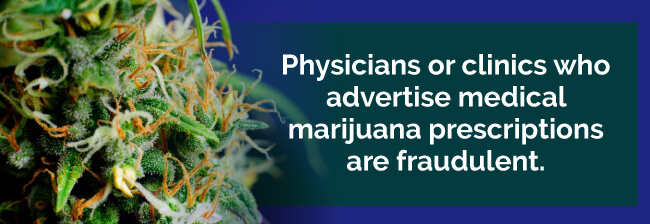
When it comes to discussing medicine, one of most commonly used terms is “prescription.” However, this term doesn’t apply to medical pot. Due to the conflict between state and federal laws, patients must have a medical weed recommendation, rather than a prescription. It’s critical for patients and their families to understand the differences between a medical cannabis recommendation versus a prescription due to medical fraud.
A medical marijuana prescription is nonexistent. Licensed medical cannabis doctors don’t offer them, nor do pharmacies or dispensaries fill them. State governments don’t recognize them, either. The reason the term’s so prevalent now is because it’s associated with medicine.
While more than 25 states, as well as dozens of researchers and doctors, recognize medical cannabis as a medicine, the federal government still sees it as a controlled substance. Since federal law overrules state laws, it’s not possible for doctors to provide a medical cannabis prescription to patients.
A medical marijuana recommendation does exist. Across the U.S., where medical weed is legal, doctors issue recommendations each day to patients in need. Different from a regular prescription, a medical marijuana recommendation is a statement from your physician that expresses their professional view that medical pot would benefit you.
Unlike a medical cannabis prescription, dispensaries and state governments accept a medical cannabis recommendation. A noted difference between standard prescriptions and medical marijuana recommendations is that prescriptions come with a designated dosage and instructions for use, while recommendations don’t.
As mentioned, the reasoning behind providing medical marijuana recommendations versus prescriptions stems from matters of legality. State laws, where medical weed is legal, differ from the overarching federal statutes for controlled substances.
The Controlled Substances Act classifies medical cannabis as a Schedule I drug. As a controlled substance within the Schedule I category, medical marijuana carries some of the harshest penalties by law.
Two of the designated features of Schedule I substances, according to the Act, include:
It’s these features of the Controlled Substances Act that make licensed physicians unable to prescribe medical cannabis, as it’s classification designates it as being unsafe and unaccepted for medical use — which recent research has proven otherwise.
States have discovered a loophole to legalize medical marijuana, allowing patients to alleviate their pain and discomfort through the medical cannabis program and the recommendation. Instead of prescribing medical weed to patients and risking their license and legal action, physicians could recommend or certify patients for participation in the state’s medical weed program.
The Ninth Circuit confirmed the legality, as well as the safety of this approach in 2002.
In the case Conant v. Walters, which was a class action suit brought forth by several doctors and patients in California, the argument was put forth that the First Amendment protects recommending medical weed. While the federal government tried to prove that the recommendation encourages the use of medical marijuana, the Ninth Circuit disagreed and sided with the doctors and patients.
As a result, states across the U.S. adopted the approach of recommending medical cannabis, instead of prescribing it, as it protects both patients and their physicians from legal action by the federal government, per the Controlled Substances Act.
Many patients looking into medical weed are often unaware of the difference between medical cannabis prescriptions and recommendations, which places them at risk of being treated by a fraudulent doctor or medical center.
When you’re searching for a medical cannabis doctor near you, it’s essential to understand their legal bindings to ensure you or your loved one receives the medicine they need from a compassionate, educated physician who abides by the laws surrounding medical weed.
Your medical cannabis doctor can provide a recommendation, as well as the following to you:
By law, your medical cannabis doctor cannot provide:

Physicians or clinics who advertise medical marijuana prescriptions are fraudulent. They’re also uneducated in the research, use and side effects of medical weed, which places you or your loved one at risk as a patient.
By providing you with a “prescription” for medical cannabis, doctors are helping themselves. No dispensary or state government will accept a medical weed prescription, which leaves you unable to receive a medical marijuana card to purchase your medicine.
While scams do exist on the promise of providing medical cannabis prescriptions, being aware of them lets you take the appropriate steps when searching for a licensed and trusted medical marijuana doctor.
When looking for a medical cannabis doctor near you, take the following steps:
Educating you and your family about your state’s laws helps you recognize when something may not be right. A physician who promises a same-day medical cannabis card, for instance, is likely fraudulent, as the state government must approve applications and issue these cards.
At MarijuanaDoctors.com, we connect patients with trusted and licensed medical marijuana doctors. Our licensed physicians are not only compassionate, but they’re also educated about medical weed and its ability to treat numerous qualifying conditions. Every doctor in our directory has also been verified and confirmed by our experienced team.
Start your search for a medical cannabis doctor near you today!
No Information on MarijuanaDoctors.Com should be used to diagnose, treat, prevent or cure any disease or condition. You can view our Full Disclaimer here.